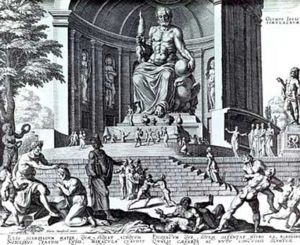Zeus: Difference between revisions
No edit summary |
(refs needed for "Greek Mythology" section) |
||
| Line 10: | Line 10: | ||
== Greek Mythology == | == Greek Mythology == | ||
<!-- This entire section requires referencing. And, no, neither Wikipedia nor encyclopedias are sources. --> | |||
Zeus Kroniōn (descendant of Cronus), or simply Zeús or Zdeús (Greek Ζεύς) or Dias (Greek Δίας) ("divine king") is the leader of the gods and god of the sky and thunder in Greek mythology. Typically symbolized as a bearded able-bodied man who can strike down people with lighting bolts he hurls. As demonstrated in the Greek Mythos (and mirrored in Colonial religion), he fathered many of the heroes and heroines (see the external links section) and was featured in many of their stories. Though he was the god of the sky and thunder, he was also the most supreme cultural artifact; in some senses, he was the embodiment of Greek religious beliefs and the archetypal Greek deity. | Zeus Kroniōn (descendant of Cronus), or simply Zeús or Zdeús (Greek Ζεύς) or Dias (Greek Δίας) ("divine king") is the leader of the gods and god of the sky and thunder in Greek mythology. Typically symbolized as a bearded able-bodied man who can strike down people with lighting bolts he hurls. As demonstrated in the Greek Mythos (and mirrored in Colonial religion), he fathered many of the heroes and heroines (see the external links section) and was featured in many of their stories. Though he was the god of the sky and thunder, he was also the most supreme cultural artifact; in some senses, he was the embodiment of Greek religious beliefs and the archetypal Greek deity. | ||
| Line 19: | Line 21: | ||
* As Xenios, Zeus was the patron of hospitality and guests, ready to avenge any wrong done to a stranger. | * As Xenios, Zeus was the patron of hospitality and guests, ready to avenge any wrong done to a stranger. | ||
* As Horkios, he was the keeper of oaths. Liars who were exposed were made to dedicate a statue to Zeus, often at the sanctuary of Olympia. | * As Horkios, he was the keeper of oaths. Liars who were exposed were made to dedicate a statue to Zeus, often at the sanctuary of Olympia. | ||
* As Agoraios, Zeus watched over business at the agora, and punished dishonest traders. | * As Agoraios, Zeus watched over business at the agora, and punished dishonest traders.{{citation needed}} | ||
== External Link == | == External Link == | ||
Revision as of 15:25, 6 March 2007

Zeus or Jupiter is the first Lord of Kobol (Bastille Day), from whom all other Lords apparently sprung. He is father to Apollo ("33", "The Hand of God") and, quite likely, to Athena as well (The Hand of God).
Zeus mirrors the Olympian Pantheon from Earth.
Tom Zarek plays on Lee Adama's call-sign, Apollo, in "Bastille Day" by referring to Commander Adama as "Zeus." The allusion was repeated in "The Farm", after Zarek had received word that Adama survived Sharon Valerii's assassination attempt.
According to Pythia, Zeus was the one who warned the 12 tribes that any return to Kobol would be paid for in blood.
Greek Mythology
Zeus Kroniōn (descendant of Cronus), or simply Zeús or Zdeús (Greek Ζεύς) or Dias (Greek Δίας) ("divine king") is the leader of the gods and god of the sky and thunder in Greek mythology. Typically symbolized as a bearded able-bodied man who can strike down people with lighting bolts he hurls. As demonstrated in the Greek Mythos (and mirrored in Colonial religion), he fathered many of the heroes and heroines (see the external links section) and was featured in many of their stories. Though he was the god of the sky and thunder, he was also the most supreme cultural artifact; in some senses, he was the embodiment of Greek religious beliefs and the archetypal Greek deity.
The various titles applied to Zeus emphasized different aspects of his wide-ranging authority:
- Olympios emphasized Zeus's kingship over both the gods and the Panhellenic festival at Olympia.
- A related title was Panhellenios, ('Zeus of all the Hellenes') to whom Aeacus' famous temple on Aegina was dedicated.
- As Xenios, Zeus was the patron of hospitality and guests, ready to avenge any wrong done to a stranger.
- As Horkios, he was the keeper of oaths. Liars who were exposed were made to dedicate a statue to Zeus, often at the sanctuary of Olympia.
- As Agoraios, Zeus watched over business at the agora, and punished dishonest traders.[citation needed]